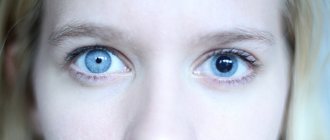127
Author of the article
Tsareva Elena Vladimirovna
Reading time: 5 minutes
A A
Almost all of us have encountered such an unpleasant phenomenon as eye irritation or conjunctivitis. A single episode, as a rule, is soon forgotten and the person does not focus on this problem. If eye irritation bothers you regularly and for no apparent reason, you can draw a conclusion about the psychosomatic origins of the disease, according to many famous psychologists. Let's try to figure out what can cause conjunctivitis, how this disease manifests itself, and also consider methods of treatment and self-help from a psychological point of view.
- What it is?
- Features of the disease
- Causes
- The emergence according to famous psychologists
- Luule Viilma
- Liz Burbo
- Sinelnikov
- Louise Hay
- Treatment
- Useful videos
- Conclusion
What it is?
Any disease has physiological and psychological causes. If a person does not have eye diseases, injuries or mechanical damage, but eye irritation occurs constantly, we can safely talk about the psychosomatic causes of the disease. Typically, psychosomatic conjunctivitis occurs in 20-30% of all cases of the disease.
The direction in medicine that studies the influence of psychological factors on the development of physical diseases is called psychosomatics. Adherents of this theory believe that disruptions in the nervous system lead to physical damage to organs. Psychosomatics is based on the body's response to stress.
Psychological problems are expressed physically through certain illnesses when our body signals a psychological problem or internal conflict. Emotional, sensitive people with “thin skin” are most often susceptible to psychosomatic diseases. The main thing that is recommended to start treatment with is to stabilize the internal state, minimize stress and strengthen the nervous system.
Expert opinion
Ermolaeva Tatyana Borisovna
Ophthalmologist of the highest category, Candidate of Medical Sciences
Before diagnosing the psychosomatic nature of the disease, it is necessary to undergo an examination by an ophthalmologist. Regardless of what exactly caused the disease, it is simply necessary to see a doctor.
Almost all psychologists agree on one thing - the basis of conjunctivitis is fear and reluctance to look at your life.
Features of the disease
Regardless of its nature, the disease manifests itself through the following series of symptoms:
- swollen eyelids;
- blurred vision, feeling of a film on the eyes;
- constant itching or burning;
- redness of the eyes;
- painful reaction to light;
- severe headache, frequent migraines;
- increased tearfulness;
- sensation of a foreign body in the eye.
Expert opinion
Ermolaeva Tatyana Borisovna
Ophthalmologist of the highest category, Candidate of Medical Sciences
Make sure you are not allergic to anything. Often, these symptoms are the result of seasonal allergies or as a result of contact with dust or animals.
Problems with the right eye symbolize the masculine side (the father or his substitute figure, his influence). The left eye is usually associated with the influence of the mother and with the perception of oneself. It is necessary to analyze the relationship with parents. Perhaps old grievances haunt you, which manifests itself in such an unpleasant disease as conjunctivitis. Have a heart-to-heart talk with your mom or dad, ask for forgiveness, try to forget old grievances.
Physiology of strabismus
Strabismus is a position of the eyeballs in which their visual axes do not coincide with the direction of the position of the object in question. With strabismus, each eye functions separately from each other and their work is not coordinated with each other. In addition, the peculiarity of this disease is that both hemispheres of the brain also cannot act simultaneously. Such people can simultaneously either think, analyze, or feel. Therefore, it is very difficult for them to adequately perceive the world and express themselves accordingly. Typically, the disease develops in childhood or adolescence.
Psychosomatics of strabismus
Psychosomatic strabismus is associated with excessive disapproval or suspicion of something or someone. Surely you are familiar with the expressions “casts a sidelong glance” and “looks askance.” They fully explain the psychosomatics of strabismus. In what cases do they say this? When someone strongly dislikes, for example, someone’s action, he literally looks askance and at the same time can still make a wry grimace.
The right eye is responsible for intellectual abilities, study, and so on. Left – for the emotional sphere. Depending on the direction of strabismus, some features in psychosomatics are distinguished:
- left eye: up – excessive emotionality in the area of manifestation of feelings;
- outward - unconscious instinctive actions, while a person, without having any bad intentions, can violate obligations under the influence of his hypersensitivity;
- inside - fear, manifested in an inferiority complex, this manifests itself in fixation on one’s hypersensitivity, while a person can completely forget or reject other traits of his character;
- outward upward - lack of coordination in time, lack of a sense of time, daydreaming, irrational thinking and irrational actions;
- up – excessive emotionality in the area of manifestation of intelligence, easily confused;
Causes
Psychologists note several of the most likely psychological causes of the disease:
Have you ever had conjunctivitis caused by psychological reasons?
Not really
- a person's subconscious reluctance to see something or someone. Perhaps it’s a hated job, an unpleasant person, a boring city, or all three;
- a person’s desire to escape from any conflict;
- unwillingness to see the problem and face it;
- fear and anxiety for one's own future;
- strong anger, resentment or disappointment in something;
- fear of some upcoming event;
- conjunctivitis, as a kind of way of postponing an unpleasant task. A person physically deprives himself of the opportunity to go to an event or meeting.
- illness as a means of relieving excessive anxiety;
- prohibition on one's own health or beauty. Surprisingly, this also happens. Anxiety arises against the background of the belief “I’m doing too well.”
Expert opinion
Ermolaeva Tatyana Borisovna
Ophthalmologist of the highest category, Candidate of Medical Sciences
Official medicine does not recognize the psychological causes of this disease; this position is considered controversial and not scientifically proven. However, practice shows that psychosomatics is a very real phenomenon.
Psychological causes of conjunctivitis in adults
Typical symptoms are hyperemia and itching of the eyelid, the appearance of pus, and red streaks on the white part of the eyeball. In the morning, dried discharge accumulates on the eyelashes, making it difficult to open the eyes. There is a runny nose and swelling of the nasal mucosa. Without proper treatment, the process becomes chronic.
In official medicine, the reasons for the development of conjunctivitis are identified:
- damage by viruses;
- bacterial infection;
- eye injury;
- allergic reaction;
- influence of ultraviolet radiation;
- side effect of the drug;
- lack of vitamins;
- non-compliance with the rules of wearing contact lenses;
- chronic inflammatory processes in the maxillary sinuses, lacrimal ducts.
According to official medicine, there are no psychological reasons for the development of the inflammatory process on the mucous membrane of the eye.
But long-term unsuccessful treatment or constant relapses of the disease, subject to the doctor’s recommendations and hygiene rules, may indicate a psychogenic form of the disease.
The emergence according to famous psychologists
Now let’s get acquainted with the opinions of famous psychologists and find out how they speak about the occurrence of conjunctivitis.
Luule Viilma
The famous gynecologist Luule Viilma, who discovered the gift of a psychologist, believes that conjunctivitis occurs when a person is overwhelmed with anger . It can arise in relation to oneself, other people, the world around us. A person needs to be able to see the positive in the world around him.
The presence of conjunctivitis indicates a strong fear of looking into the future, rejection of oneself or the current life situation. As a treatment, the psychologist offers a series of affirmations or positive attitudes that must be repeated regularly to create the desired mood.
Examples:
- I am not in danger;
- life is beautiful and full of joy and I see it;
- there is peace and harmony in my soul.
Liz Burbo
The main cause of conjunctivitis, a psychologist and author of numerous books, identifies unexpressed anger and suppressed negative emotions. As a main recommendation, Liz Burbo advises reconsidering the life situation in which a person finds himself .
Frequent inflammatory processes in the visual analyzer system are an attempt by the body to consider life in all its colors and manifestations. But a person extinguishes these aspirations with an effort of will. If the body protests against the situation in which a person is now, then it is necessary to change it and then everything will work out.
Sinelnikov
Dr. Sinelnikov emphasizes that conjunctivitis is more a problem for children and adolescents than for adults, since children are more susceptible to negative events and their psyche is more often susceptible to various types of trauma.
For adults, there is only one way out - to clear their thoughts and then the world will become a better place. It is necessary to create a comfortable environment for yourself, to cleanse your soul of anger, fear and resentment. Sinelnikov recommends avoiding phrases such as:
- so that my eyes do not see you;
- I can't look at it;
- I can't see you.
With phrases like these, a person can program himself for eye diseases. The human subconscious takes all words literally, this has been proven. Try to monitor your speech and thoughts, they tend to materialize. Positive attitudes work wonders.
Louise Hay
Louise Hay believes that the main cause of conjunctivitis is fear of the future and reluctance to look forward. There can be many reasons - from childhood trauma to betrayal in adulthood.
The treatment, according to the author, is to rethink the past, accept its events and analyze the current life situation. Perhaps the patient had no choice and this was the only opportunity to get out of trouble with minimal losses. You need to accept what happened as the only correct option at that time.
After rethinking the events of the past, it is recommended to change your attitude towards the present. You need to try to love the world in all its manifestations, start looking at life with “lovers’ eyes” and it will reciprocate.
Eyes. Psychosomatics: Repression of what “we cannot or do NOT want to see”
Ecology of consciousness. Psychology: Eyes are the most expressive part of our face. There are many sayings and sayings associated with it: “Fear has big eyes”, “Sadness is visible in clear eyes, and sadness in a white face”, “Not in one eye”, “The eye sees, but the tooth numbs”, “Eyes in a wet place” “,” “An envious eye sharpens the soul,” “Talk face to face,” “Out of sight, out of mind,” “The eyes are afraid, but the hands are busy.”
Eyes are the most expressive part of our face. There are many sayings and sayings associated with it: “Fear has big eyes”, “Sadness is visible in clear eyes, and sadness in a white face”, “Not in one eye”, “The eye sees, but the tooth numbs”, “Eyes in a wet place” “,” “An envious eye sharpens the soul,” “Talk face to face,” “Out of sight, out of mind,” “The eyes are afraid, but the hands are busy.”
Indeed, the eyes take part in the expression of almost all human emotions.
We can see how the eyes fill with tears, how the eyes fill with rage, how the eyes are clouded with sadness, how they shine with joy and happiness, how they grow round in surprise and hide from shame and lies.
If we could look deep enough into people's eyes, we would see their doubts, pain, sadness, anger - all their feelings.
And one of the tasks for our listeners is to look carefully and with interest into the eyes of different people: different ages, different social status, acquaintances and strangers.
How do you think they cope with the task?
Twenty percent do it with pleasure, interest, curiosity and feel joyful, inspired, and filled with vitality.
Others find this task difficult. Some “forget” to do it altogether, others only manage to make eye contact with their loved ones, and still others avert their eyes when in contact with strangers or those higher in position.
How do they feel in their body?
They feel that the body is compressing, the abdominal muscles are contracting, there is coldness in the stomach, the shoulders are folded forward, the chest in front is folded inward, breathing is held back, the head is tilted forward and down, the throat is constricted, there is stiffness in the arms, and they do not feel their legs at all.
What do you think they can see in other people's eyes?
More often they see fear, sadness, anxiety, sadness, and caution.
Tell me, whose fear is this? This is their fear that they will now say “What are you staring at?”, this is their anxiety “What will this person think about me?”, this is sadness and sadness and longing for close human contacts.
But not everything is so simple. In the eyes of other people, we can really see all this; we simply “read” the state of the other person with our body and eyes.
These may be emotions that people don't want to show. In the East, and now in the West, showing oneself in sadness or anger means losing face. We try to “keep face” and hide our weaknesses not only from others, but also from ourselves.
And when we pass by and don’t look up at a person, it’s as if we are signing a silent agreement: “I won’t look into your soul if you don’t look into mine.” And it is considered good form not to notice the essence of another person under the mask he wears.
We look into each other's eyes less and less, even when we say hello and automatically answer: “Everything is fine!” to the question “How are you?”
What happens when we make eye contact with another person?
Our eyes literally touch. And if the energy flow connecting the eyes of two people is heartfelt and soft, it can awaken a feeling of love in their hearts. This is where the expression “love at first sight” comes from.
But the eyes can radiate both love and anger and hatred. Then we talk about the “evil gaze,” which supposedly has the power to send “damage” or the “evil eye” to a person. An angry look can really be so strong that it can immobilize a person. A hateful gaze can be quite powerful and “freeze” an impressionable person.
Wide open eyes, soft and radiating love - such eyes look at the world with admiration and some fear at the same time. Unfortunately, few people have such eyes. The world of our childhood was not able to evoke such feelings in everyone.
Nothing describes the relationship between mother and child better than the amount of eye contact between them. When a child sees pleasure and love in the mother's eyes, he dissolves in that warmth and pleasure. If the mother is depressed, her empty eyes hang over the child like a cloud. And then her gaze violates the child’s sense of security and his sense of reality.
Pain makes us shrink physically and mentally. We don't want to see painful and unpleasant scenes, pain on people's faces. If this type of reluctance becomes chronic and unconscious, it can impair eye function. Myopia or myopia is the inability to see beyond your own nose. The myopic eye is afraid, but a person rarely feels this fear. His fear comes from childhood experiences, it is the fear of seeing the eyes of his parents full of hatred and anger.
Closing your eyes is an attempt to ignore the reality of a threatening situation. By narrowing our field of vision, we seem to distance the threat.
Tears are a basic element of stress relief. A child cries when he doesn't get what he needs. This way he relieves unbearable tension.
The ban on the expression of emotions in childhood causes tension in the eye area and serves to suppress crying, fear, anger - after all, these are the emotions that are clearly expressed through the eyes.
Fear of making a mistake, a blunder, a mistake.
Fear of seeing yourself assessed by other people.
Fear of offending, offending another person.
Repressing what “cannot be seen.”
This might interest you:
Joe Vitale: HOW to attract what you want into your life
Emotional dullness
All this leads to the formation of muscle spasms, which distort the functioning of the visual apparatus and disrupt microcirculation. published
Author: Irina Sozonova
PS And remember, just by changing your consumption, we are changing the world together! © econet
Treatment
The main recommendation, in addition to visiting a doctor, is to work with a psychotherapist. It is necessary to understand in detail the underlying causes of the problem.
Expert opinion
Ermolaeva Tatyana Borisovna
Ophthalmologist of the highest category, Candidate of Medical Sciences
With the help of medications, only the external causes of the disease can be eliminated. However, as long as there is internal conflict, this problem will repeat itself again and again.
Self-help tips:
Do you recite positive affirmations?
Not really
- It is necessary to understand what exactly causes internal tension and aggression and try to protect yourself as much as possible from unfavorable factors.
- Try not to accumulate negative emotions, think about alternative methods of expressing anger or resentment. Physical activity helps a lot.
- Say positive affirmations daily. This is a very good way to direct your thinking in a positive direction.
- Don't dwell on the past or worry too much about the future. Live in the compartment of today, here and now.
- Do yoga and meditation.
- Try to improve relationships with loved ones.











